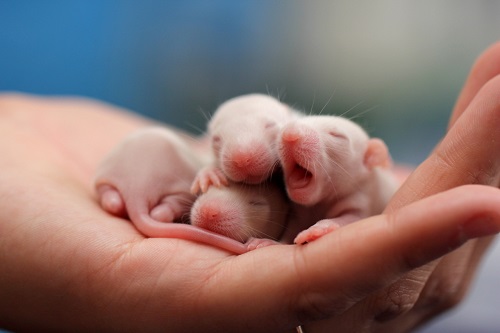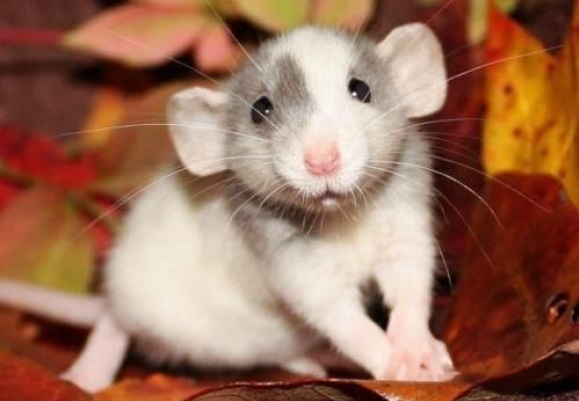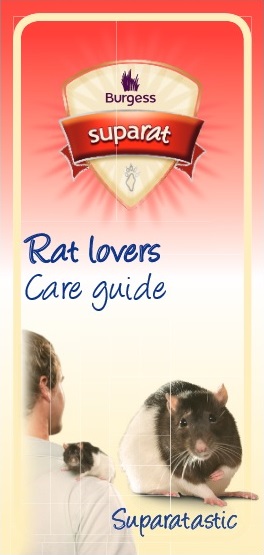-

-
Pet Rat Care
Pet Rats
Just because they're small, don't go thinking that you can give a rat any less care, commitment and love than you'd give to a bigger pet. In this guide, we show you by far the best way to give your pets the time of their little lives – which usually last around two years.
The more you get to know your rats (Latin name Rattus norvegicus), and get to know about them, the better. There's more fun to be had, and more reward, every single day.
  
|
| All About Your Pet
|
Choosing Your Pet
|
Home & Equipment
|
Feeding
|
Taming & Handling
|
Exercise & Play
|
Cleaning
|
Health
|
Did You Know?
|
Rats make excellent pets, especially for older children and adults. They're clean, friendly, inquisitive and highly intelligent. They love a bit of problem-solving - and you can even teach them tricks. They bond well with people and rarely bite.
Although rats are sleepy-heads all day long, they're usually up in the late afternoon and evening. Bright-eyed, long-tailed and ready for action - absolutely ideal for when you get in.
Background
Wild rats can be found all over Europe, although they originated in Asia. The population spread across the world when the rats were sneaky stowaways on merchant ships. The domestic or fancy rat is descended from the Brown Rat (also known as the Norwegian Rat) and is thought to have originated from Asia moving into Europe in 1553 and then onto the US in 1775.
Domesticated rats are very clean, intelligent animals. They are very different to their wild cousins.
There are many different colour variations among rats, and three types of coat – smooth-haired, rex and hairless.
Click Here To Download Rat Care Guide

Rats make good family pets. They’re generally very clean, highly intelligent and are ideal for older children. Whilst rats are inexpensive to keep, you should buy as large a cage as possible. Rats often sleep during the day but are not fully nocturnal like hamsters. They’ll enjoy spending time with you during the day or evening. On average, rats live between 2 and 21⁄2 years.
Dumbo rats are a special variety of the normal fancy rat and have larger, differently positioned ears. Fancy rats are available in a variety of colours.
All pet owners have a responsibility to look after and care for their pets. If you’re thinking about having rats as pets, learn as much as you can about how to care for them beforehand. You should take your lifestyle and household into account when deciding whether you can offer them a good home. This leaflet explains rats’ basic needs so you can decide if they’re right for you...
We strongly recommend that rats are kept in same sex pairs or groups as they’re very sociable and human contact alone is not enough. You should buy your rats at the same time as they’ll already be friends, although new rats can sometimes be introduced later.
To take the best care of your rats, you’ll need all these things:
Large multi-level cage
Wood shavings
Soft bedding
Tubes and other toys
Suparat complete food
Ceramic food bowl
Water bottle
Gnaw blocks
Pet Safe disinfectant
Rats need lots of exercise and stimulation and love to explore so housing them in a large cage is important. There are many types of rodent cages available. However, it’s essential that you buy a cage that is designed for rats and NOT for smaller rodents such as hamsters. Ideally, you should buy a large, wire multi-level cage as this will provide lots of interest and allow your rats to use the bars for climbing.
Rats are extremely agile and can jump two feet or more!
Position their home away from radiators or windows to prevent sudden changes in temperature. Cover the base of the cage with a paper-based or other suitable little. Avoid using woodshavings or sawdust as they can irritate rats' eyes and noses and cause allergic reactions. Provide your pets with a private space to sleep in filled with nesting material to keep them cosy. Avoid using straw as it’s too sharp and may damage their eyes and mouths.
In the wild rats are scavengers and will eat a wide variety of foods. Pet rats should also be provided with a varied diet containing all the necessary food groups. Whilst in our care we feed them Burgess Suparat nuggets which contain all the nutrients they need in every mouthful. Nuggets prevent selective feeding. This is a common problem associated with muesli diets where your pets eat the bits they like and leave the rest, resulting in nutrient deficiencies. We recommend that you continue to feed your rats suparat nuggets to minimise any stress caused by a change of food at the same time as being taken to a new home. If you do wish to change your rats’ diet, introduce new food slowly over a period of about 10 days, phasing out the old food completely.
You can feed your pets fresh food such as cooked egg, cooked chicken scraps and washed fruit and vegetables such as apples, carrots and sprouts to supplement their basic diet and provide different flavours for them to try. It’s nice to treat your rats too - hanging seed sticks or hiding treats or monkey nuts around their cage provides fun and tasty challenges as well as stimulating natural behaviour! When feeding your pets any of the additional foods mentioned here, you should do so in moderation to avoid stomach upsets and weight gain, restricting treats to one or two a day.
A ceramic or metal food bowl is best for your pets – they’re gnaw-proof, hard to knock over and easily cleaned and disinfected. Remove left over food and wash their food bowl thoroughly everyday before re-filling it. Rats tend to drink more water than other rodents so a large water bottle is essential. Provide fresh water daily.
When you take your rats home they should be left alone for the first day or two to allow them to get used to their new home. Let them sniff your hand so they get to know you and your smell. Gently stroke your pets to reassure them and once they’re comfortable with this you can pick them up. A rat should be gently scooped up with both hands. Never pick your rats up by their tails. Once they’re used to you they’ll enjoy coming out to play. As rats like to chew, they should always be supervised when they’re out of their cage.
Whilst they’re awake rats need a stimulating environment and love to play so make sure you give them lots of toys to keep them entertained. Rat, ferret and some large bird toys are great fun as well as tunnels and ropes. Avoid buying hamster toys as they’re too small. A large rat ball or wheel is ideal for burning off energy.
Make sure your rats’ wheel is suitable for them as they can catch their tails in wheels with open bars.
By simulating their natural environment, you can enrich your pets’ lives - keep a pair of rats or a group of them, hide food and treats around their cage and provide lots of different toys to climb on, hide in and chew.
Clean their home thoroughly at least once a week using hot water and a pet-safe disinfectant. If your pets use one area of their cage as a toilet this will need to be cleaned daily - using a litter tray in this area will make cleaning easier.
With the correct care and attention your rats should stay healthy. However, they can be prone to a number of ailments, for example, respiratory infections.
As with all rodents, rats’ teeth grow constantly so it’s important to provide them with wooden toys, mineral stones or treats to gnaw on.
A healthy rat is active and playful with a full, shiny coat, bright eyes and a clean nose. Signs of illness include red staining around the eyes and nose, bald patches or skin irritation, lethargy and loss of appetite. If your pet shows signs of being unwell contact your vet immediately.
Like all animals, rats can suffer from excess weight so only provide healthy treats in moderation.
Health Checks
Dental
Gnawing toys are an essential part of your pets’ dental routine and should always be available as they help to prevent overgrown teeth.
Vitamins and supplements
Vitamins can be added to your pets’ food or water. Probiotic supplements can help to maintain healthy digestion and relieve stress. Getting used to their new surroundings can be stressful for your rats so consider buying probiotic supplements before you take them home.
Fleas, mites and flies
Keep an eye on your pets’ skin and coat for signs of fleas and mites such as bald patches or irritation.
Grooming
Regular grooming will strengthen the relationship between you and your pets and it can also help to highlight health problems. Groom your guinea pigs once a week or daily if they have long hair.
Cleaning
Clean out your pets’ home at least once a week using hot water and a pet-safe disinfectant.
Health and hygiene
Always wash your hands thoroughly with soap and water immediately after cleaning, feeding or handling your pet. Also wash after contact with any of their equipment. Always supervise children to ensure they do not put their pet, (or objects that the pet has been in contact with) near their mouths. Ensure children wash their hands thoroughly with soap and water immediately after handling their pet. Do not kiss your pet.